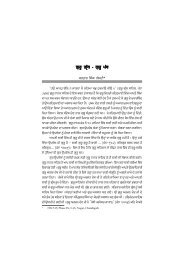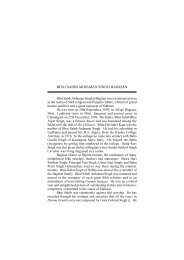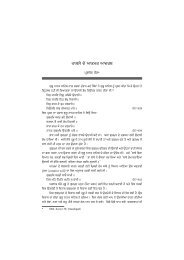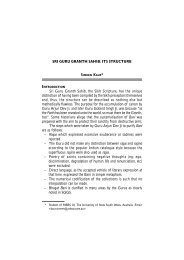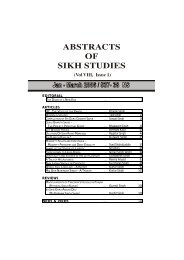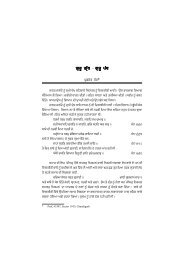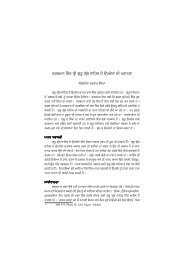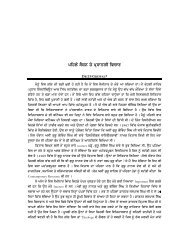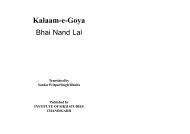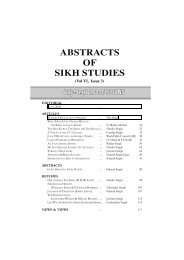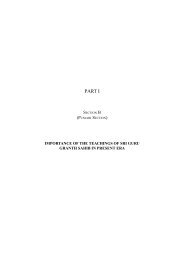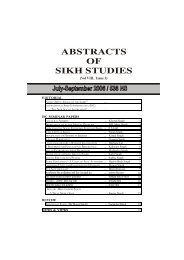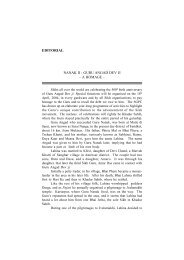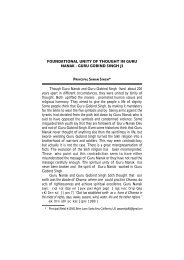editorial articles reviews news & views - Institute of Sikh Studies
editorial articles reviews news & views - Institute of Sikh Studies
editorial articles reviews news & views - Institute of Sikh Studies
Create successful ePaper yourself
Turn your PDF publications into a flip-book with our unique Google optimized e-Paper software.
56<br />
ABSTRACTS OF SIKH STUDIES : APRIL-JUNE 2005 / 537 NS<br />
followed in all other states, Punjab being the only exception. On the<br />
reorganization <strong>of</strong> Madras state, some <strong>of</strong> its areas were allocated to<br />
Tamilnadu, Andhrapardesh and Karnataka. The rivers <strong>of</strong> the erstwhile<br />
Madras state, namely, Krishna, Godawari, and Mahanadi did not flow<br />
in the reorganised Tamilnadu state, and so it was not given the waters<br />
<strong>of</strong> those rivers, since it ceased to be a riparian state. The case <strong>of</strong><br />
Haryana is idenictical, as it ceased to be riparian state. Punjab rivers<br />
do not flow in Haryana territories, and so it is not entitled to waters <strong>of</strong><br />
Punjab rivers. Rajasthan state made an application in the tribunal to<br />
claim waters <strong>of</strong> Narbada river, which had been set up in the dispute<br />
between Maharashtra and other riparian states, which was rejected, as<br />
it was not a riparian state and not entitled to the waters <strong>of</strong> that river.<br />
Rajasthan is a non-riparian state for Punjab rivers also, and is thus not<br />
entitled to the waters <strong>of</strong> these rivers. Similarly, Delhi is not riparian<br />
state for Punjab rivers and as such not entitled to waters <strong>of</strong> these<br />
rivers. Thus, none <strong>of</strong> these states has any right to Punjab river waters.<br />
There is no lawful agreement for the distribution <strong>of</strong> Punjab river<br />
waters to other states. The essential ingredients <strong>of</strong> an agreement are<br />
consideration <strong>of</strong> agreement, free consent <strong>of</strong> parties, and competency<br />
<strong>of</strong> the parties to enter in to agreement. In the so-called agreements to<br />
distribute Punjab river waters, none <strong>of</strong> these ingredients are present,<br />
viz-a-viz, neither consideration, nor free consent and nor competency<br />
<strong>of</strong> the parties to the agreement. The provisions <strong>of</strong> Indian Contract<br />
Act specifically lay down that the agreement or contract which is<br />
without consideration or without free consent (as the consent having<br />
been taken under undue influence or the parties being not competent<br />
to enter into agreement) is null and void and <strong>of</strong> no binding effect. In<br />
the case <strong>of</strong> agreements by states, there are further requirements laid<br />
down in Article 299 <strong>of</strong> Constitution <strong>of</strong> India, that it must be in<br />
accordance with the procedure prescribed therein and in the name <strong>of</strong><br />
the Governors <strong>of</strong> the states. None <strong>of</strong> these constitutional procedures<br />
have been followed in these so-called agreements. In fact, these cannot<br />
be called lawful as agreements, at all.<br />
The 1955 distribution <strong>of</strong> Punjab river waters was made by<br />
recording in the proceedings <strong>of</strong> the meeting <strong>of</strong> deputy secretaries,<br />
held in the irrigation department at Dehli, that Punjab can spare 8<br />
MAF waters for Rajasthan, but Punjab needs will be met first, and



